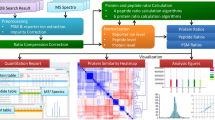Abstract
In analyzing the proteome using mass spectrometry, the mass values help identify the molecules, and the intensities help quantify them, relative to their abundance in other samples. Peptides that are shared across different protein sequences are typically discarded as being uninformative w.r.t each of the parent proteins.
In this paper, we investigate the use of shared peptides which are ubiquitous (~50% of peptides) in mass spectrometric data-sets. In many cases, shared peptides can help compute the relative amounts of different proteins that share the same peptide. Also, proteins with no unique peptide in the sample can still be analyzed for relative abundance. Our paper is the first attempt to use shared peptides in protein quantification, and makes use of combinatorial optimization to reduce the error in relative abundance measurements. We describe the topological and numerical properties required for robust estimates, and use them to improve our estimates for ill-conditioned systems. Extensive simulations validate our approach even in the presence of experimental error. We apply our method to a model of Arabidopsis root knot nematode infection, and elucidate the differential role of many protein family members in mediating host response to the pathogen.
Preview
Unable to display preview. Download preview PDF.
Similar content being viewed by others
References
Alves, P., Arnold, R.J., Novotny, M.V., Radivojac, P., Reilly, J.P., Tang, H.: Advancement in protein inference from shotgun proteomics using peptide detectability. In: Pac. Symp. Biocomput., pp. 409–420 (2007)
Bantscheff, M., Schirle, M., Sweetman, G., Rick, J., Kuster, B.: Quantitative mass spectrometry in proteomics: a critical review. Anal. Bioanal. Chem. 389(4), 1017–1031 (2007)
An Advanced Treatise on Meloidogyne: Volume I. North Carolina State University Graphics (1985)
Jammes, F., Lecomte, P., de Almeida-Engler, J., Bitton, F., Martin-Magniette, M.L., Renou, J.P., Abad, P., Favery, B.: Genome-wide expression profiling of the host response to root-knot nematode infection in Arabidopsis. The Plant Journal 44, 447–458 (2005)
Jeong, Y.M., Mun, J.H., Lee, I., Woo, J.C., Hong, C.B., Kim, S.G.: Distinct roles of the first introns on the expression of Arabidopsis profilin gene family members. Plant Physiol. 140, 196–209 (2006)
Jones, A.M., Bennett, M.H., Mansfield, J.W., Grant, M.: Analysis of the defence phosphoproteome of arabidopsis thaliana using differential mass tagging. Proteomics 6(14), 4155–4165 (2006)
Kim, S.J., Kim, K.W., Cho, M.H., Franceschi, V.R., Davin, L.B., Lewis, N.G.: Expression of cinnamyl alcohol dehydrogenases and their putative homologues during Arabidopsis thaliana growth and development: lessons for database annotations?. Phytochemistry 68, 1957–1974 (2007)
Mallick, P., Schirle, M., Chen, S.S., Flory, M.R., Lee, H., Martin, D., Ranish, J., Raught, B., Schmitt, R., Werner, T., Kuster, B., Aebersold, R.: Computational prediction of proteotypic peptides for quantitative proteomics. Nat. Biotechnol. 25(1), 125–131 (2007)
Marmagne, A., Rouet, M.A., Ferro, M., Rolland, N., Alcon, C., Joyard, J., Garin, J., Barbier-Brygoo, H., Ephritikhine, G.: Identification of new intrinsic proteins in Arabidopsis plasma membrane proteome. Mol. Cell Proteomics 3, 675–691 (2004)
Wiese, S., Reidegeld, K.A., Meyer, H.E., Warscheid, B.: Protein labeling by itraq: a new tool for quantitative mass spectrometry in proteome research. Proteomics 7(3), 340–350 (2007)
Author information
Authors and Affiliations
Editor information
Editors and Affiliations
Rights and permissions
Copyright information
© 2009 Springer-Verlag Berlin Heidelberg
About this paper
Cite this paper
Dost, B., Bandeira, N., Li, X., Shen, Z., Briggs, S., Bafna, V. (2009). Shared Peptides in Mass Spectrometry Based Protein Quantification. In: Batzoglou, S. (eds) Research in Computational Molecular Biology. RECOMB 2009. Lecture Notes in Computer Science(), vol 5541. Springer, Berlin, Heidelberg. https://doi.org/10.1007/978-3-642-02008-7_26
Download citation
DOI: https://doi.org/10.1007/978-3-642-02008-7_26
Publisher Name: Springer, Berlin, Heidelberg
Print ISBN: 978-3-642-02007-0
Online ISBN: 978-3-642-02008-7
eBook Packages: Computer ScienceComputer Science (R0)




